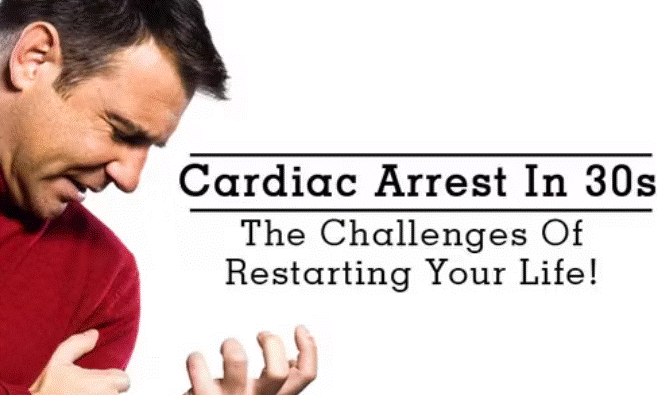Why Are More People in Their 30s Suffering from Cardiac Arrest?

Cardiac arrest cases are rising among people in their 30s, with factors like stress, poor diet, and sedentary lifestyle contributing to the growing risk.
Once again prevalent in older folks, cardiac arrest is now afflicting a startlingly high proportion of younger people, especially those in their 30s. This growing tendency has raised worries, as evidenced by the tragic instance of South Korean actor Park Min-jae, who died of cardiac arrest while visiting China at the age of 32. On November 29, 2024, Park Min-jae tragically passed away from a sudden cardiac event, highlighting the fact that even young people who appear fit can experience cardiac arrest without warning. Understanding the risk factors that contribute to cardiac arrest and how to manage them is essential as the number of cardiac arrest patients rises.
Recognising Cardiac Arrest: Signs and Causes
A dangerous condition known as cardiac arrest is brought on by an electrical error in the heart that results in an abrupt loss of breathing, consciousness, and heart function. Heart arrest is brought on by an electrical problem in the heart that throws off its regular rhythm, preventing blood from getting to essential organs. This is in contrast to a heart attack, which is brought on by a blockage limiting blood supply to the heart. Within minutes, the incident could be fatal if prompt treatment is not taken, such as performing cardiac arrest emergency measures (defibrillation or CPR).
The symptoms of cardiac arrest might appear suddenly and intensely. Dizziness, shortness of breath, chest discomfort, and unconsciousness are typical symptoms. In certain instances, it may even happen suddenly. It may be vital to identify cardiac arrest after symptoms appear. However, as many young individuals may not exhibit any symptoms until it is too late, they might not be aware of the risks they face.
Why Are More Young People Getting Arrested for Heart Attacks?
Cases of cardiac arrest among younger adults, particularly those in their 30s, have increased noticeably in recent years. Here are several important elements that could be causing this expanding trend:
1. A passive lifestyle
Due to the rise of remote work and long computer sessions, young people are increasingly leading sedentary lives. This lack of exercise is linked to conditions including obesity, high blood pressure, and cardiovascular disease, all of which increase the risk of cardiac arrest.
2. Unhealthy Eating Habits
Young adults typically consume a diet high in processed foods, sugar, salt, and unhealthy fats. Cardiac arrest can be caused by heart disease-related conditions such as diabetes, high blood pressure, and excessive cholesterol. Though similar factors are also raising the incidence of cardiac arrest in women, unhealthy diets have been specifically linked to cardiac arrest in men.
3. Prolonged Anxiety and Stress
Heart health can be directly impacted by chronic stress and anxiety, which are caused by the mental stresses of work, education, and social expectations. Stress chemicals such as cortisol and adrenaline can cause heart strain and increase the risk of arrhythmias and cardiac collapse. More attention has also been paid to the issue of panic-induced cardiac arrest, which occurs when stress overloads the heart's electrical system.
4. Lack of Sleep
Stress levels are raised and the body's regular cycles are disturbed by the common sleep patterns among young adults. Long-term sleep deprivation raises blood pressure and the danger of heart disease, which raises the risk of cardiac arrest death.
5. Substance Abuse
Cocaine, amphetamines, and high alcohol use have all been linked to cardiac arrest in recreational settings. These medications have the potential to cause major damage to the heart's electrical system, increasing the risk of sudden cardiac arrest.
6. Smoking and vape pen use
Despite greater awareness, smoking and vaping are still prevalent among young people. These activities increase the risk of cardiac arrest while flying or even while exercising by causing inflammation, narrowing blood vessels, and creating arrhythmias.
7. Environment and Genetics
Genetic predispositions and environmental exposures may be linked to the increasing incidence of cardiac arrest in young adults. Even healthy individuals may be at increased risk for heart disease due to genetic factors.
8. Overtraining and excessive physical activity
Excessive strain on the heart can be caused by overtraining or severe physical activity without adequate rest, even if exercise is beneficial for the heart. This is particularly problematic for those who have undiagnosed cardiac issues because it raises their risk of cardiac arrest when they fly or exercise hard.
For instance, the tragic incident involving Park Min-jae
The recent cardiac arrest case of Park Min-jae, who tragically passed away while travelling due to a sudden heart attack, highlights how unpredictable this condition may be. Performers and athletes who appear to be in good health are not immune. Even though the cause of Park's death is still being investigated, his untimely demise emphasises how urgent it is to address risk factors for cardiac arrest in both men and women.
Taking Initiative: Awareness and Prevention
A healthy diet, frequent exercise, stress reduction, and getting enough sleep are among lifestyle changes that young adults should prioritise in order to lower the rising rate of cardiac arrest. In order to identify early indicators of heart issues, routine health examinations are very crucial. It is possible to considerably reduce the likelihood of suffering cardiac arrest following symptoms by addressing these risk factors.
The terrible Park Min-jae case and the rising number of youth cardiac arrests serve as a reminder of the significance of heart health. In order to stop this alarming trend and save lives, greater awareness and preventive care are essential.








